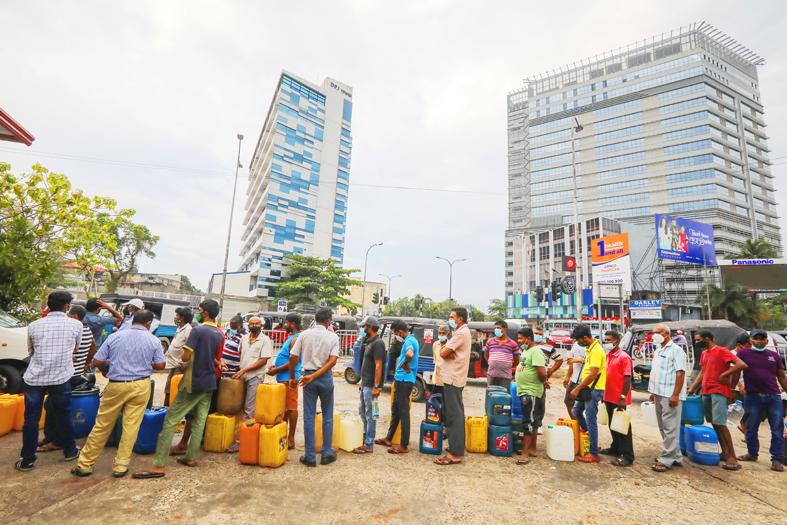The IMF yesterday told Sri Lanka that its foreign debt was “unsustainable,” and called for devaluation and higher taxes to revive the economy.
The COVID-19 pandemic pushed the South Asian nation’s tourism sector — a key foreign-exchange earner — off a cliff, and the government in March 2020 imposed a broad import ban to try to shore up foreign currency.
However, more than two years on, Sri Lanka is grappling with food and fuel shortages, which this week saw its public transport crippled as buses ran out of diesel and the state imposed blackouts.

Photo: EPA-EFE
Following its annual review of the cash-strapped country, the IMF said its fast-dwindling foreign reserves were inadequate to service the country’s current foreign debt of US$51 billion.
Official data show that Sri Lanka needs nearly US$7 billion to service its foreign debt this year, but the country’s external reserves at the end of January were only US$2.07 billion — just enough to finance one month’s imports.
The IMF stressed “the urgency of implementing a credible and coherent strategy to restore macroeconomic stability and debt sustainability,” recommending a return to a “market-determined and flexible exchange rate” — meaning a devaluation of the Sri Lankan rupee.
While the Central Bank of Sri Lanka set rate is 197 rupees to the US dollar, a thriving black market offers 260 rupees for US currency notes.
This disparity has led to a more than 50 percent decline in foreign remittances through official banking channels.
However, the IMF said that the country’s economic woes began before the COVID-19 pandemic.
Soon after taking office in November 2019, Sri Lankan President Gotabaya Rajapaksa cut several taxes nearly in half, the IMF said, driving down government revenue and forcing it to borrow more.
Among recommendations to address the crisis was to raise income taxes and VAT, “complemented with revenue administration reform,” the IMF said.
The lack of US dollars to import fuel has led to an energy crisis.
Besides bringing public transport to a halt on Wednesday, the state’s electricity company also imposed a daily seven-and-a-half-hour electricity blackout — the longest scheduled power rationing in more than a quarter of a century.
Without US dollars to finance essential imports, rice, milk powder, sugar and wheat flour are in short supply, while local industries are unable to bring in raw materials and machinery.
The shortages pushed inflation to 16.8 percent in January — the fourth consecutive record rise — and the IMF said it expected it to remain in the double digits.
International rating agencies have downgraded Sri Lanka over expectations that it might not be able to service its foreign debt, although the government insists that it can meet its obligations.

CHIP WAR: Tariffs on Taiwanese chips would prompt companies to move their factories, but not necessarily to the US, unleashing a ‘global cross-sector tariff war’ US President Donald Trump would “shoot himself in the foot” if he follows through on his recent pledge to impose higher tariffs on Taiwanese and other foreign semiconductors entering the US, analysts said. Trump’s plans to raise tariffs on chips manufactured in Taiwan to as high as 100 percent would backfire, macroeconomist Henry Wu (吳嘉隆) said. He would “shoot himself in the foot,” Wu said on Saturday, as such economic measures would lead Taiwanese chip suppliers to pass on additional costs to their US clients and consumers, and ultimately cause another wave of inflation. Trump has claimed that Taiwan took up to

A start-up in Mexico is trying to help get a handle on one coastal city’s plastic waste problem by converting it into gasoline, diesel and other fuels. With less than 10 percent of the world’s plastics being recycled, Petgas’ idea is that rather than letting discarded plastic become waste, it can become productive again as fuel. Petgas developed a machine in the port city of Boca del Rio that uses pyrolysis, a thermodynamic process that heats plastics in the absence of oxygen, breaking it down to produce gasoline, diesel, kerosene, paraffin and coke. Petgas chief technology officer Carlos Parraguirre Diaz said that in

SUPPORT: The government said it would help firms deal with supply disruptions, after Trump signed orders imposing tariffs of 25 percent on imports from Canada and Mexico The government pledged to help companies with operations in Mexico, such as iPhone assembler Hon Hai Precision Industry Co (鴻海精密), also known as Foxconn Technology Group (富士康科技集團), shift production lines and investment if needed to deal with higher US tariffs. The Ministry of Economic Affairs yesterday announced measures to help local firms cope with the US tariff increases on Canada, Mexico, China and other potential areas. The ministry said that it would establish an investment and trade service center in the US to help Taiwanese firms assess the investment environment in different US states, plan supply chain relocation strategies and

Japan intends to closely monitor the impact on its currency of US President Donald Trump’s new tariffs and is worried about the international fallout from the trade imposts, Japanese Minister of Finance Katsunobu Kato said. “We need to carefully see how the exchange rate and other factors will be affected and what form US monetary policy will take in the future,” Kato said yesterday in an interview with Fuji Television. Japan is very concerned about how the tariffs might impact the global economy, he added. Kato spoke as nations and firms brace for potential repercussions after Trump unleashed the first salvo of